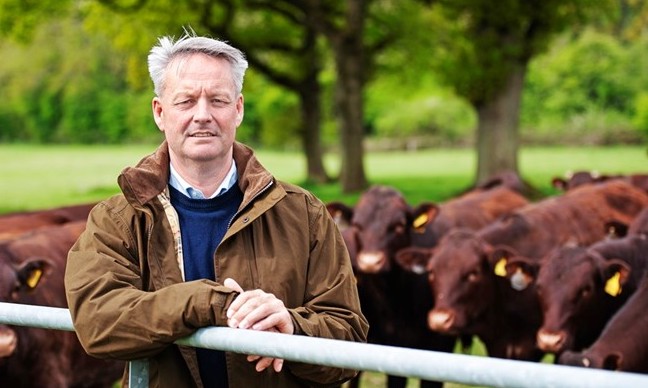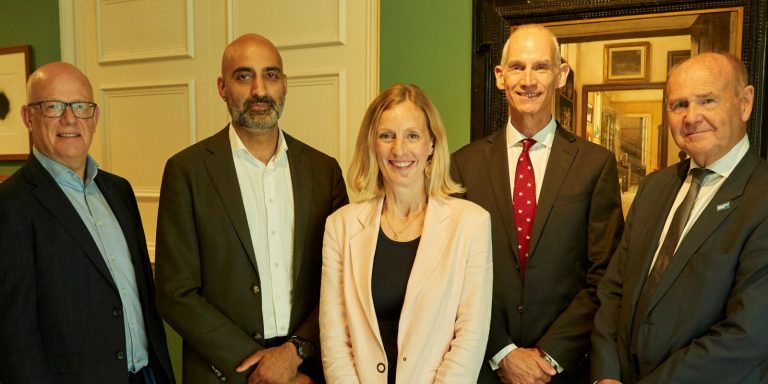Countryside and Leeds Federated partner to build 77 homes near Bradford
Countryside Partnerships, the mixed-tenure developer, has partnered with Leeds Federated housing association to deliver 77 new homes in Birkenshaw near Bradford.
38 of the homes will be owned and managed by Leeds Federated and offered in affordable rent and shared ownership tenures.
The remaining 39 homes will be sold on the open market by Linden Homes, Countryside Partnerships’ sister housebuilding brand.
The new development builds on the relationship between Countryside Partnerships and Leeds Federated, with the two parties currently providing 55 new homes near Dewsbury.
The homes in Birkenshaw will be built using local materials, including red brick, art stone and grey and red concrete tiled roofs. Each home will have garden space, whilst there will also be hedgerow planting, native shrub planting, ornamental planting and tree planting across the site.
Construction work is set to start in September.
Andrew Poyner, Managing Director of Countryside Partnerships Yorkshire, said: “We’re really pleased to be working with Leeds Federated again to bring forward this development.
“The site will offer a good mix of homes in different tenures, helping to meet housing need and giving people a great opportunity to live locally. We’re also utilising the strengths of our unique business model by using our housebuilding brand Linden Homes to market the open market properties.”
Stephen Ellis, head of development at Leeds Federated, said: “It is a real pleasure to be partnering with Countryside Partnerships again to deliver additional good quality, new, affordable homes for affordable rent and shared ownership.
“We are very excited to be involved in this new development in Birkenshaw which will help more people build their futures.”
West Yorkshire forklift firm expands green offering following £656,000 funding injection
A Dewsbury-based forklift and warehouse equipment dealership is set to increase its turnover by a fifth after introducing Net Zero lithium-ion vehicles, thanks to support from Lloyds Bank.
Forktruck Solutions sells and repairs forklift trucks and warehouse equipment to customers across the UK. In a bid to become more sustainable, it decided to pivot its business strategy post-pandemic from selling only gas and diesel-powered vehicles to offer lithium-ion forklift trucks.
To store and process the new carbon zero stock, the company secured £600,000 from Lloyds Bank to expand its warehouse by 31% from 4,000 sq ft to 13,000 sq ft.
A further £56,250 of funding from Lloyds Bank was used to install solar panels, six electric car charging stations for employees, LED lighting throughout its warehouse and offices, and two living moss walls to help improve air quality.
Since expanding the premises, the business has employed six new salespeople, three service support employees and four engineers.
The business has also increased its turnover from £1.1million to £7million over the past three years.
Now, it is targeting 20% growth per year and forecasts a £15-20million turnover in the next five years.
Simon Penny Smith, Managing Director of Forktruck Solutions, said: “While lockdown caused great disruption to the business, we used the time to take stock of what we were offering and what our customers wanted.
“There was an increasing demand for more sustainable vehicles, so we decided to introduce the lithium-ion technology to our customer base and beyond. Since, the business has gone from strength to strength and our customers are reaping the benefits with huge savings on fuel and massive carbon reductions in their operations.
“From increasing productivity to saving around 10-15 tonnes of carbon each year, the new trucks will also save our customers about 70% in fuel cost alone compared to traditional forklift trucks. Thanks to Lloyds Bank, we’ve been able to really focus on becoming more sustainable and now have the space to stock the new lithium forklift trucks.
“The support has also allowed us to look ahead and embrace sustainable opportunities on-site. For us, it’s important we practice what we preach and operate in the most energy-efficient way possible.”
Craig Smith, relationship manager for Lloyds Banking Group, said: “We are proud to be supporting a business like Forktruck Solutions that realises the long-term benefits of operating more sustainably.
“The firm is now providing customers with a greener alternative while also reducing its own carbon emissions, a perfect example of how a business can help our region on the road to Net Zero.
“We’ll continue to be by the side of Forktruck Solutions, and other sustainably-minded businesses across the region, and look forward to supporting them as they continue on their sustainable journey.”
Criminal solicitors acquired by East Yorkshire firm
Williamsons Solicitors has acquired a criminal law practice in a deal regarded as a “coup.”
Hull-based Amber Solicitors LLP, comprising well-known solicitors Ian Phillip and Richard Fowler, became part of Williamsons on August 1.
Both firms have a reputation in criminal law spanning decades, with Williamsons Solicitors providing a broader range of private client services via its offices in Hull, Driffield and Bridlington.
Acting head of Williamsons’ criminal law department Marc Pollard said that clients from the two firms would benefit from the enhanced combination of skills and experience.
“Both Ian and Richard have a fantastic reputation and they will fit in perfectly as we have a shared ideology and an established relationship through many years of working in Hull and surrounding areas. It’s a real coup for us and we are very excited to have them on board.”
Richard Fowler and Ian Phillip started Amber Solicitors in the late 1990s, rapidly gaining a reputation for challenging authority and fighting for the underdog. Ian became one of the youngest solicitor advocates in the city and has worked on many high-profile cases, with Richard mainly working “at the coal face” of criminal law.
Richard Fowler said: “We are very proud of our reputation, so it was important that we became part of an equally well-respected and principled firm. It will also provide Ian and I with the opportunity to give back a little by helping a new generation of criminal lawyers through Williamsons’ excellent training schemes.”
He added that joining Williamsons would allow for expansion and the ability to provide clients with “global” representation through Williamsons Solicitors’ wide range of law services.
Neil Waterhouse, Williamsons Solicitors’ operations director, said that growth of criminal law departments was uncommon in the current era of cuts to legal aid.
“With the acquisition of Amber, we now have combined expertise which is unrivalled locally. We provide an essential service to people who are in urgent need of expert legal representation, and it is vital that we ensure its longevity through smart ways of working and providing career opportunities.”
Cost of rural crime has soared by £9m a year, says insurance company
In its 2023 Rural Crime Report the insurer revealed that rural crime cost the UK an estimated £49.5m in 2022, up from £40.5m the previous year.
The rise comes against a background of soaring values and the low supply of farm machinery worldwide. Criminal gangs have responded by establishing illicit global markets for farm machinery and technology equipment.
As a result, the UK cost of agricultural vehicle theft reported to NFU Mutual soared by 29% to £11.7m in 2022.
A survey of 175 NFU Mutual agents, who are based in rural communities across the UK, found 70% knew farmers who had been repeat victims of rural crime. And 86% said thieves are cashing in on the limited supply of vehicles and rising prices.
NFU Vice President David Exwood said: “As the NFU Mutual’s report highlights, over the past 18 months, highly organised gangs of criminals have continued to plague the British countryside, stealing livestock, high-value farm machinery and expensive GPS equipment, as well as trespassing on private land and regularly fly-tipping tons of rubbish.
“The huge increase we’ve seen in criminal activity is significantly impacting farm businesses and farming families both financially and emotionally, with many rural communities left feeling vulnerable and intimidated.
“All at a time when the industry is facing numerous other pressures, not least soaring production costs.”
David Lloyd Leisure fined £2.55m after drowning at venue in Leeds
David Lloyd Leisure Club Limited has been fined £2.55 million and ordered to pay £258,355.80 in costs at Leeds Crown Court after a three-year-old boy drowned at the the company’s Club in Moortown, Leeds.
During the investigation health and safety inspectors for the council identified inadequate lifeguarding arrangements at the club over a number of years, leading up to the tragic event.
The investigation found that David Lloyds Leisure had been exposing club members to risks contrary to Section 33(1) of the Health and Safety at Work etc. Act 1974, between September 1, 2015, and April 22 2018 in the David Lloyd Leisure Club.
Leeds City Council environmental health service are responsible for regulating health & safety standards across a wide range of commercial sectors including retail, wholesale distribution, hotels and catering, offices, and leisure industries.
Councillor Mohammed Rafique, Leeds City Council executive member for climate, energy, environment and green space, said: “I would like to begin by offering the councils sincere condolences to the the Wright family, this tragic story underlines the importance for employers and duty holders to ensure that the safety of their employees and customers is a priority.
“I would also like to thank the council’s environmental health and legal teams, and the Barristers from St Paul’s Chambers for their dedication and hard work to ensure David Lloyd Leisure Limited were held accountable for their failings.
“The council will always look to work with and support businesses to meet their legal duties, however we won’t hesitate to take enforcement action in cases of serious and prolonged noncompliance.”
Greater Lincolnshire gets regional ‘defence and security’ status
Greater Lincolnshire is now recognised by the Government as the third of the nation’s new Regional Defence and Security Clusters.
The announcement has come from the Defence and Security Accelerator, created by the Government to accelerate innovation in defence and security in order to keep the UK safe and prosperous.
Established by the Greater Lincolnshire LEP, the cluster will support innovation in the field of intelligence, surveillance, target acquisition and reconnaissance.
The ambition is to establish Greater Lincolnshire as a national defence and security innovation, production and service hub and to promote the area’s ability to develop and support vital defence and security programmes.
John Ridge, Director of Defence Innovation at the MOD, said: “Lincolnshire has a long history of manufacturing, research, development, and innovation expertise to generate military capability for the UK and a solid link to innovation and collaboration between MOD and industry.
“The Greater Lincolnshire RDSC lands in the middle of that rich Lincolnshire innovation environment with a key focus on technologies supporting the ISTAR force at RAF Waddington and data science and has positioned itself well to extend that regional contribution.
“It is the MOD’s aspiration that as well as supporting the development of defence and security capabilities for the UK, RDSCs will to promote our ability to develop and support programmes to increase regional wealth through greater public and private inward investment and the creation of high-value, better paid jobs.”
Anita Friend, Head of the Defence and Security Accelerator, said: “In supporting the creation of Regional Defence and Security Clusters in the Defence and Security Industrial Strategy, the MOD and especially my team within DASA recognised that collaboration between the established industry suppliers, SMEs and academia, supported by regional partnerships, was key to increasing the diversity in the regions to develop, exploit and commercialise advanced innovation for defence and security.
“The Greater Lincolnshire Defence & Security Cluster will have a vital central role in fostering that collaboration for Lincolnshire and as part of the growing network of regional clusters.”
Major General Julian Free CBE, Deputy Vice Chancellor at the University of Lincoln and Chair of the Greater Lincolnshire LEP Defence and Security Board, said: “Today marks an important milestone for the region as the culmination of a lot of work to connect the regional defence and security sector SME, prime contractor and supply chain community, to raise the profile of the tremendous innovation they are driving to meet the challenges of today and tomorrow, and to promote the opportunities for other companies to locate or expand here as part of the cluster.
“It also provides a springboard for individuals to pursue exciting and rewarding high-tech, high-value careers in Greater Lincolnshire.”
The other two existing clusters are the South West RDSC and the Three Counties RDSC in the West Midlands.
Sentiment stable and output falls while SME manufacturers’ investment plans scaled back
Sentiment among SME manufacturers was stable for a second successive quarter in July, though this represents a relative improvement compared with the sharp declines seen 2022 and in early 2023, according to the CBI’s latest SME Trends survey.
Output declined for a fourth successive quarter in the three months to July. Total new orders also fell moderately, though the volume of total orders books was stable at a level deemed “below normal.” Both output and new orders are expected to grow moderately in the three months to October.
Supply-side constraints to output continue to diminish, though the share of firms citing labour shortages as a limit on output over the next three months remained historically high, as did the share citing the availability of materials or components. A rising share of SMEs (almost two-thirds) cited orders or sales as a constraint on output.
SMEs have scaled back investment plans. Capital expenditure on buildings and on plant & machinery is expected to fall in the year ahead, with rising shares citing the availability of internal finance and the cost of finance as factors likely to limit capex. Spending on product and process innovation is also expected to decline, while training expenditure will be held steady.
Ben Jones, CBI lead economist, said: “Sentiment among SME manufacturers remains subdued, with output and new orders falling over the last quarter. Worryingly, investment intentions for the year ahead have weakened across the board in the face of uncertain demand, persistent labour shortages and, increasingly, higher finance costs as interest rates rise.
“In a challenging environment for manufacturing investment, confidence-building measures have a big role to play, whether that’s scaling up Made Smarter into a national programme or providing clearer signals of intent over the UK’s response to the US Inflation Reduction Act and the EU’s Green Industrial Plan.”
Yorkshire food and drink businesses offered interest-free 12-month loan
The York and North Yorkshire Growth Hub has started to promote a Loan to Equity scheme for food and drink businesses in its area.
Under the scheme firms can apply for an interest-free loan of up to £100,000 over a 12-month term without any monthly repayment obligations. When the loan matures, it can either be fully repaid or converted into equity in the candidate’s business, subject to the lender’s discretion.
It’s said that the scheme offers a valuable source of funding at zero cost, enabling firms to develop and scale their operations. Additionally, throughout the loan period, the businesses will receive valuable business support. A successful outcome involves the conversion of the loan into equity at the end of the 12-month term. Such a conversion also serves as a strong indicator of the investor’s willingness to provide future equity-based investments on the loan anniversaries in subsequent years.
The Loan to Equity scheme is open exclusively to high-potential UK-based Food and/or Drink manufacturing businesses engaged in retail or direct consumer sales. To be considered, candidate businesses must demonstrate a compelling consumer proposition and a well-defined business plan. They should have progressed beyond the initial developmental stages and be ready to scale. They must also be:
Key details of the Loan to Equity scheme are as follows:
- Registered in the UK
- Owner-operated
- Engaged in Food and/or Drink industry
- Have a consumer-branded product
- Annual turnover up to £4 million
- Present a compelling business plan with ambitious growth targets
- Be in operation for five years or less since incorporation
- Provide evidence of consumer demand for their brand
- Eligible businesses can receive a secured interest-free loan for a 12-month period, with a maximum value of £100,000, upon successful completion of the application (including the business plan). The ultimate goal is to convert the loan into an equity stake when it matures. For investment purposes, the company’s valuation will be based on 5 times EBIT (Earnings Before Interest and Taxes).
- Throughout the loan period, borrowers will benefit from professional advice from the lender to help them achieve their company goals.
- Monthly meetings between the lender and the borrower will be held to review company performance, plans, and progress.
- At the 6-month mark, the lender will inform the borrower of their intention to either call in the loan upon maturity or convert it into equity at the end of the 12-month term, based on a valuation of 5 times EBIT.
- Successful conversion of the loan to equity will grant the investor the right to appoint a Director to the invested business.
- Moreover, the successful conversion opens the pathway for future equity investments in the business, if desired by both parties, on the 2nd, 3rd, 4th, and 5th anniversaries of the original loan. The company’s valuation for these subsequent investments will also be based on 5 times EBIT on each anniversary.
Cheers! Pub beer price duty now 11p a pint lower than supermarkets
More than 38,000 UK pubs and bars have seen a tax cut on the pints they pull from now on as the duty paid on drinks on tap in pubs will be up to 11p lower than at the supermarket.
The changes are designed to help pubs compete on a level playing field with supermarkets, so they can continue to thrive at the heart of communities across the UK. The Brexit Pubs Guarantee announced in the Chancellor’s Spring Budget secures the pledge that pubs will always pay less alcohol duty than supermarkets going forwards.
It comes as other landmark changes to the alcohol duty system also come into effect today, which see drinks taxed by strength for the first time and a new relief – named Small Producer Relief – to help small businesses and start-ups create new drinks, innovate and grow.
The changes have automatically lowered the duty in shops and supermarkets on many of the UK’s favourites including certain bottles of pale ale, pre-mixed gin and tonic, hard seltzer, Irish cream, coffee liquor and English sparkling wine, amongst others.
Prime Minister Rishi Sunak said: “I want to support the drinks and hospitality industries that are helping to grow the economy, and the consumers who enjoy the end result.”
The lower alcohol tax for draught beer result from the expansion of Draught Relief, which effectively freezes or cuts the alcohol duty on the vast majority of these drinks. The government has pledged that the duty pubs and bars pay on these drinks will always be less than retailers, known as the Brexit Pubs Guarantee.
This tax reduction is part of a wider shake up of the alcohol duty system which also comes into effect from today – the biggest in 140 years.
The key changes are:
- all products taxed in line with alcohol by volume (ABV) strength, rather than different duty structures for different drinks
- fewer main duty rates, from 15 to 6, to make it easier for businesses to grow and operate
- there will be lower taxes on lower alcohol products – those below 3.5% alcohol by volume (ABV) in strength – a huge growth area in the drinks industry
- all drinks above 8.5% ABV will pay the same rate regardless of product type
Government changes CE marking rules to ease business burden
The Department for Business and Trade is to extend indefinitely the use of CE marking for businesses, applying to 18 regulations owned by the department.
This comes as part of a wider package of smarter regulations designed to ease business burdens and help grow the economy by cutting barriers and red tape. Following extensive engagement with industry, British firms will be able to continue the use of CE marking alongside UKCA.
The Business Secretary acted urgently on this issue, to prevent a cliff-edge moment in December 2024 when UKCA was set for entry. This intervention will ensure businesses no longer face uncertainty over the regulations and can cut back on unnecessary costs freeing them up to focus on innovation and growth.
Business Minister Kevin Hollinrake said: “The Government is tackling red tape, cutting burdens for business, and creating certainty for firms – we have listened to industry, and we are taking action to deliver. By extending CE marking use across the UK, firms can focus their time and money on creating jobs and growing the economy.”
Tina McKenzie, Policy Chair of the Federation of Small Businesses said: “It’s welcome to see the continued recognition of CE marked products. This will allow time for small firms to adjust to the UKCA marking system and focus on growing their business both at home and overseas.”
Stephen Phipson, CEO of Make UK, the manufacturers’ organisation said it was a pragmatic decision. “Manufacturers will very much welcome and support this move. It will help safeguard the competitiveness of manufacturers and aid the UK as a destination for investment. It should bring more confidence about doing business in the UK and recognises the need to work with the reality of doing business. Make UK has worked extensively with UK Government pushing hard for this decision and we are pleased the ongoing engagement has delivered this positive outcome.”
The extension will provide businesses with flexibility and choice to use either the UKCA or CE approach to sell products in Great Britain.











